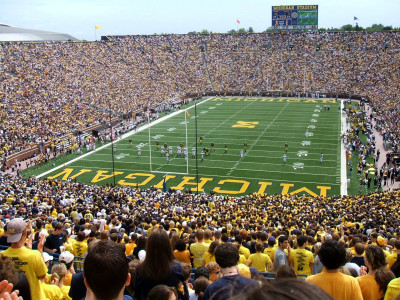
This past weekend, Michigan State University stunned the University of Michigan by scoring a walk-off defensive touchdown via a blocked punt as time expired. Michigan’s punter, Blake O’Neill, mishandled the snap with 10 seconds remaining in Saturday afternoon’s game, which led to the Michigan State touchdown.
O’Neill has since received dozens of despicable threats on social media, prompting Michigan athletic director Jim Hackett to issue an open letter condemning the hateful Wolverine fans.
“Today I awake to the shocking reality that our community who care so much about this program would send hurtful, spiteful and vicious comments to one of our students,” Hackett said.
He then clarified that it was, in fact, a small minority of students tweeting such personal attacks.
A massive majority of fans showed sympathy for the Australian punter. However, that does not make comments like “half of Michigan wants to kill you” and “kill yourself,” go away.
I empathize with O’Neill. He had played an excellent contest prior to the fumble on the game’s final snap, and ultimately, he and his team fell victim to a miraculous play from their opponents. Also, I am not worried about O’Neill’s recovery from Saturday’s game. I’m sure he’ll be fine. He’s proven time and time again that he’s a tough, valuable football player. In fact, in his native Australia, he once suffered an injury in which his liver was split.
The cold, sad reality here, though, is that athletes receive personal, hateful messages all the time.
Here’s an example. Last week, we saw Los Angeles Dodgers second baseman Chase Utley slide hard into the bag in an attempt to disrupt a double play. In doing so, he broke the leg of New York Mets infielder Ruben Tejada.
As I scrolled through Twitter in the hours following Utley’s slide, dozens of messages like “I hope Chase Utley’s kids get cancer” and “I hope Chase Utley’s parents die in a car crash tonight” painted my computer screen as the color red painted my face. I grew angrier and more disgusted with each passing text box, which continued to flow, one after the other, for far too long.
Let’s go back a little further in time, and restrict our search to college football. About four weeks ago, Central Michigan University defensive end Mitch Stanitzek delivered a massive hit on Syracuse University quarterback Eric Dungey. An injured and dizzy Dungey immediately left the game, and a soon-to-be-blasted Stanitzek was ejected. His late, high, helmet-to-helmet contact warranted serious repercussions — I doubt there would be much debate about that.
Many Syracuse fans took to Twitter, though, after watching their quarterback go down. And while I’m sure most fans did not explicitly wish any serious harm to Stanitzek, the most concerning post in this example provides Stanitzek’s personal university email address for all to see.
Let’s go back even further, to the 2013 Iron Bowl, in which the University of Alabama and Auburn University battled for a trip to the SEC Championship game. Head coach Nick Saban’s undefeated Crimson Tide entered Auburn’s Jordan-Hare Stadium as heavy favorites. They left as victims of what some writers have deemed the single greatest moment in college football’s illustrious history.
The “Kick Six,” as it has since been dubbed, featured a 100-yard return of a missed 57-yard field goal attempt taken by an inexperienced freshman with one second remaining on the clock.
Crimson Tide kicker Cade Foster missed two field goals earlier in the game, and had another blocked. So, it makes sense that he was benched in favor of freshman Adam Griffith on the last kick of the night.
After Griffith’s short kick was taken to the house by Auburn’s Chris Davis to end the game, Cade Foster received several disgusting death threats. Yes, he had a terrible game. But the kick that led directly to Auburn’s win did not come from Foster’s leg. And yet, several fans still made sure to tell him he was as good as dead to them.
Big hits, missed field goals, dropped passes in the end zone and commitments to the “wrong” college or university have all led to individuals receiving personal death threats. And although the number of fans posting such hideous messages is small, the impact it has on the sports community is quite large.
Clearly, the vast majority of Michigan fans, Mets fans, Syracuse fans and ‘Bama fans are not responsible for evil comments. And clearly, all teams (both collegiate and professional) have crazy fans that will say crazy things.
However, death threats and suicide suggestions on social media platforms do nothing but tarnish the reputation of sports fans everywhere. And unfortunately, without any major changes in philosophy (or more restrictions on social media outlets like Twitter), they will continue to do so forever.
Though the ending of last weekend’s Michigan vs. Michigan State game was virtually unbelievable for college football fans nationwide, O’Neill’s internet onslaught afterwards was practically expected. That, to me, is unacceptable.

























































































































